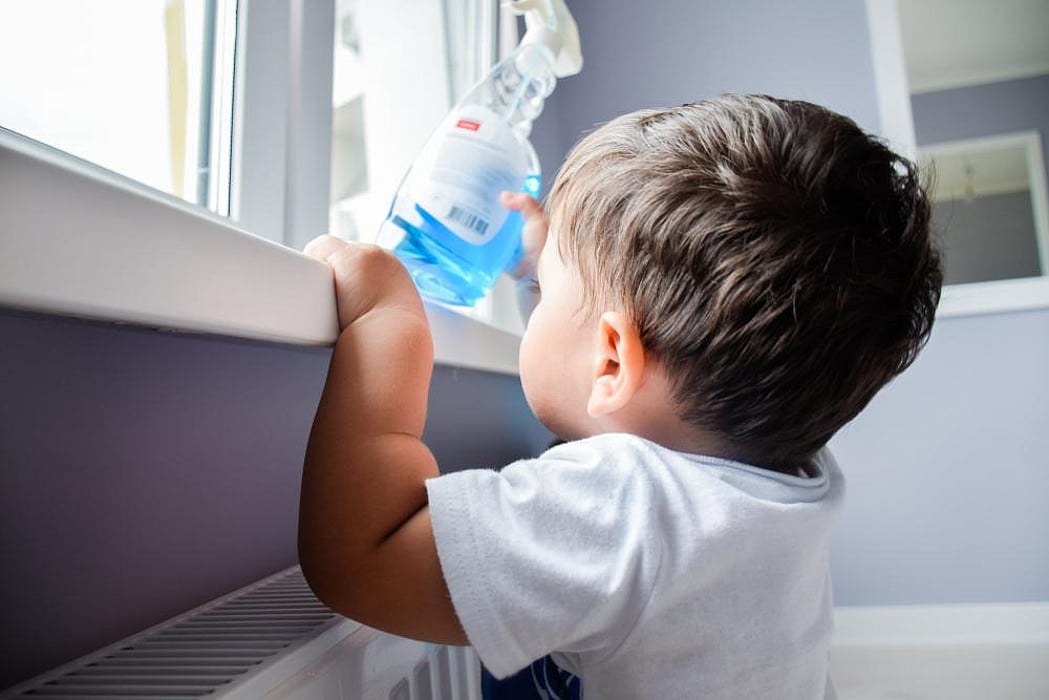Poisoning

Emergency information
If you believe someone has swallowed poison. . .
- Call 911, the National Poison Control Hotline at 1-800-222-1222, or your local poison control center.
- Have the container or substance on hand. Specific information helps the medical team choose the best treatment.
What are the signs of poisoning?
- Severe throat pain
- Burns or a burning feeling on lips or in the mouth
- Unusual drooling
- Strange breath odor
- Nausea and vomiting
- Breathing difficulty
If you see these symptoms and suspect poisoning, call 911 or the poison hotline.
Prevention
According to the CDC, there are 75 poisoning deaths in the U.S. each day. You can take steps now to prevent poisoning in your home.
Children aged 6 and under are most at risk for poisoning in the home. In fact, more than a million cases of poisoning involving young children were reported to poison control centers in 2006. Adults and pets can also ingest poisons.
Many household products tucked away in your medicine cabinet, under the kitchen sink, or in the garage are poisonous. Here are some major causes of accidental poisoning:
- Drugs and medicines cause 96 percent of unintentional poisoning deaths. Prescription, over-the-counter, and recreational drugs can all be dangerous. Don't overlook vitamins and other dietary supplements; too much of a good thing can be deadly. Iron pills are a particularly common cause of poisoning, especially in young children.
- Household cleaners and chemicals. Dishwasher detergent, drain cleaner, oven cleaner, and other products can cause serious harm.
- Antifreeze (ethylene glycol). This product actually has a sweet taste that can encourage ingestion by children and pets.
- Pesticides and baits. Pets are especially vulnerable to baits.
- Tobacco. Both children and pets can be poisoned if they ingest a relatively small amount of tobacco, including cigarette butts.
- Plants in your house and yard. Berries, leaves, flowers, and mushrooms can all be toxic. Your local gardening society or Extension Service can help you identify plants.
- Herbicides and pesticides used in lawns and gardens.
- Hand sanitizer -- young children and even teens have been known to ingest it.
Getting the poison out
It's important to dispose of toxins properly. When it comes to poisons, even empty containers can be a threat. Check with your local trash or recycling service to learn how to dispose toxic trash safely.
Put poisons out of reach away from children and pets. Never store poisons close to food products -- there's too much potential for confusion or contamination.
Leave products in their original containers. Windshield cleaner or pesticide stored in a soda bottle is an accident waiting to happen. The original container is labeled with important information about use and safety, including vital information needed to treat poison victims.
Be Prepared
Look up the phone number of your local poison control center and add it to your emergency phone lists at home, work, and/or cell phone.
Remember: There are many different types of poisons and the wrong treatment can make things worse. Getting expert help in a hurry is vital.
References
American Academy of Family Physicians. Poisoning.
American Academy of Pediatrics. Q and A: Poison treatment in the home.
Mayo Clinic. Poisoning: First Aid.
Centers for Disease Control and Prevention. Poisoning in the United States Fact Sheet.
National SAFE KIDS Campaign. Household poison prevention sheet.
Related Posts
Many Older Women Have Active Sex Lives, But Menopause Can Interfere
WEDNESDAY, May 18, 2022 (HealthDay News) -- Many women remain sexually active...
Estrogen Could Be Key to Women’s Brain Health
THURSDAY, Sept. 28, 2023 (HealthDay News) -- Being exposed to more estrogen...
Apps: They Help Manage Health Conditions, But Few Use Them, Poll Finds
MONDAY, March 7, 2022 (HealthDay News) -- Health and fitness apps are growing in...
Preservation of C-Peptide Secretion Examined in Youth With T1D
THURSDAY, Sept. 8, 2022 (HealthDay News) -- Intensive glucose control for 24...
